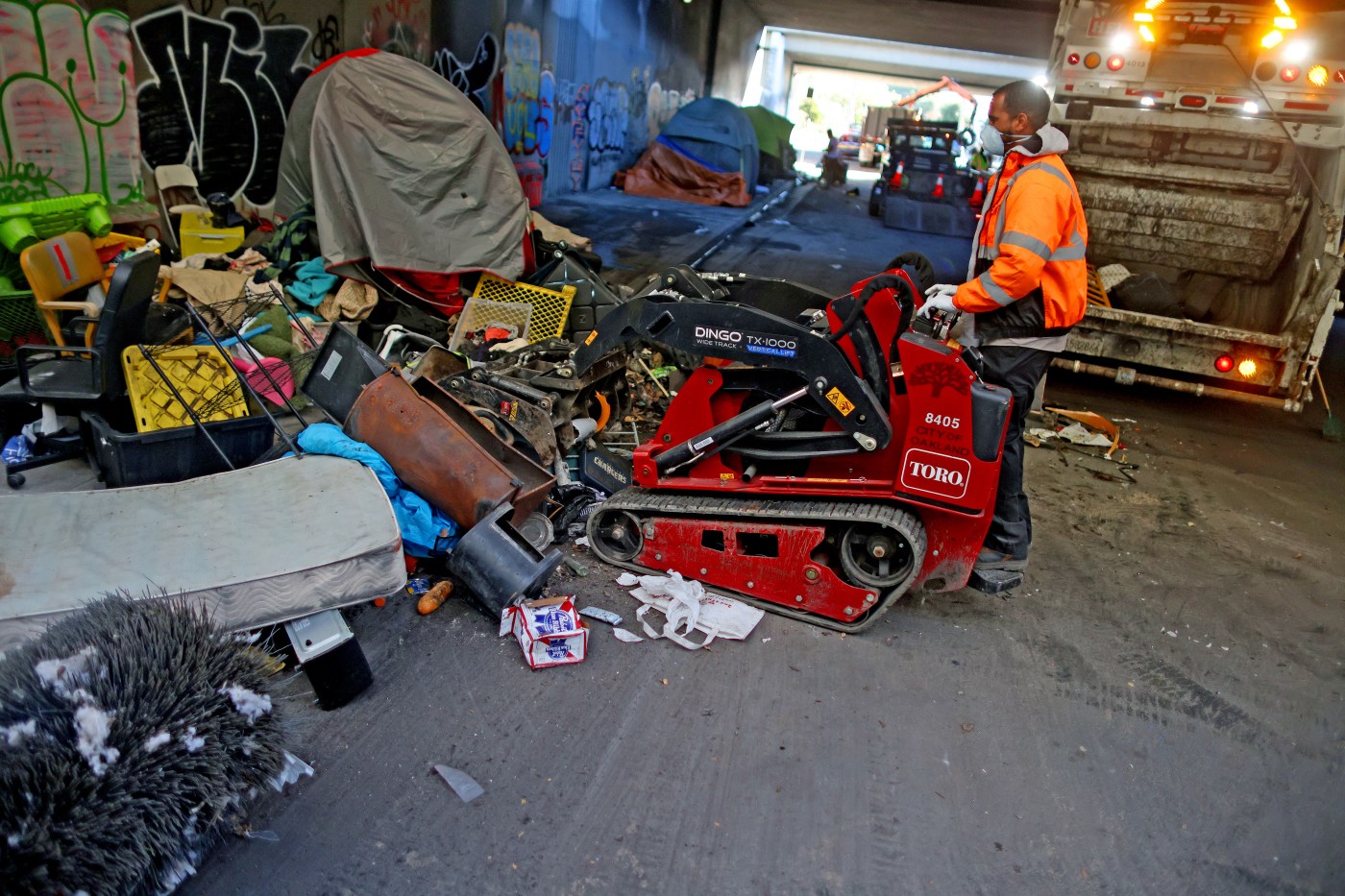When cities sweep homeless camps, the personal belongings of displaced unhoused people — Bibles and medications, tools and tax forms — are supposed to go into storage.
But as Oakland and San Jose crack down on encampments following a consequential U.S. Supreme Court decision last summer, cities are storing few items, according to records obtained by Bay Area News Group. Unhoused residents say city workers are ignoring the law and callously tossing their possessions into garbage trucks during sweeps.
“They took all my stuff and threw it away,” said an unhoused man living in an RV in East Oakland who would identify himself only as Sir Frederick.
Sir Fredrick Strayhorn, right, with his brother along International Boulevard on Wednesday, March 19, 2025, in Oakland, Calif. The brothers are currently homeless and have lost their possessions at times due to city sweeps. (Aric Crabb/Bay Area News Group)
The 49-year-old city native, who’s been homeless about six years, said he has repeatedly lost belongings during encampment sweeps, including his birth certificate, food stamps card and laptop, and has watched city workers throw people’s things into dump trucks that should have been stored under the city’s protocols.
Officials in both cities insist that they are following requirements for storing and returning belongings. Employees keep low inventory, they said, because residents are given advance notice of camp closures and clear out with their stuff beforehand.
Across the country, courts have ruled that cities violated homeless people’s constitutional rights when they seized and disposed of their belongings during sweeps.
In Oakland, a 2022 court settlement with homeless locals required the city to store belongings confiscated during sweeps and make it possible for residents to retrieve them. In San Jose, an independent auditor warned officials a decade prior that the city was at risk of similar lawsuits if unhoused residents’ personal effects weren’t respected.
Both cities since adopted protocols that items including stoves, medication and IDs must be documented and stored for 90 days, while allowing workers broad discretion not to store anything they consider soiled or hazardous for fear of contamination and bed bugs. City workers will collect clothes and tents in good condition, but not bedding.
When workers store items, they record the owner’s name — if they know it — or the location and date of the sweep.
Homeless residents in both cities can call a phone number to retrieve their stored items, officials said. In San Jose, workers post that phone number on public notices at camps before sweeps, a spokesperson said. San Jose locals can also email the city, and workers will deliver possessions, as unhoused people usually lack reliable transportation. In Oakland, homeless residents should call 311, a city spokesperson said.
Officials maintain that city workers are following these protocols. But interviews with homeless residents and internal city logs obtained by Bay Area News Group paint a different picture.
Detailed records of items city workers collected from camps — including tents and stoves, credit cards, medical devices, tools, one Bible and a drum — show relatively few belongings were stored last year. And even when officials did store items, homeless people rarely collected them, the records show.
For instance, in San Jose, officials cleared about 500 camps last year and stored 35 bags of items from about 35 locations, according to the records. Also stored were several walkers and a ladder. Only in one instance were belongings retrieved: the remains of a camp swept in March 2024, including a tent, a phone and medical items. City employees disposed of the rest after 90 days of storage, per city policy.
In Oakland, just two homeless residents retrieved their belongings last year. Oakland workers had collected roughly 175 individual items from about 40 sites but swept more than 200 camps in that time. As in San Jose, the rest was thrown out after 90 days had passed, according to the logs.
San Jose resident David Torres, 56, who has lived outside off and on for about 15 years, said city and water district employees tossed nearly all of his possessions during a January sweep of Penitencia Creek in San Jose, including new tools, food for his dogs and a bicycle. On “countless” other occasions, he said he’s had to start over without clothes, generators or critical paperwork like his birth certificate and ID.
Unhoused resident David Torres talks about his living situation in his tent near Penitencia Creek in San Jose, Calif., on Monday, March 24, 2025. (Nhat V. Meyer/Bay Area News Group)
“We have all of that in our tents,” he said. “And all of that gets thrown away if we can’t grab it.”
He said workers gave him advance notice of the sweep this winter, but he couldn’t save his own belongings in time because he was helping move his neighbors.
After every city-directed sweep he’s endured, Torres said he has called the city phone line to locate his missing belongings. He was told that city crews “determined there was no personal property” at the site. That’s typical for other homeless residents in the area, he said.
“Everyone has called it, and they never have anything of anybody’s,” he said.
A spokesperson for the city of Oakland did not respond to a request to visit the city’s storage facility. San Jose officials denied a request.
“To protect people’s belongings, we do not disclose the address publicly and do not allow members of the public access to the inside of the facility,” city of San Jose spokesperson Amanda Rodriguez said in an email. She instead sent Bay Area News Group a photo of a dozen or so bagged items on shelves.
In this photo taken March 18, 2025 by the City of San Jose, a dozen or so bags of possessions taken by city workers from homeless camps and stored. (City of San Jose)
In an interview, San Jose Mayor Matt Mahan said that the city has “robust protocols” to give unhoused residents plenty of advance notice before a sweep. That’s why the city collects relatively few belongings, he said.
“Most people choose to pack up their things and move to another location,” Mahan said.
When employees do collect and store items, “not many people take us up on that offer” to have them delivered, the mayor added.
Advocates for unhoused people scoffed at that notion.
“People have lost a lot of stuff through clean-ups and abatements,” said Gail Osmer, an advocate in San Jose. She said that many homeless residents won’t call the city phone line at all.
“They don’t call because they know their stuff isn’t there,” she said.
Under Oakland’s official “bag and tag” policy, the city will store up to one cubic yard of material for an unhoused person, a city spokesperson said in an email.
Luca Giles, who has witnessed about 75 sweeps in Oakland as a member of a community network that helps unhoused people, said “the city definitely does not follow policy once the eviction is finally started.”
Related Articles
As Oakland prepares to clear Lake Merritt tents, homeless residents unsure where to go
Emotional goodbyes as East Bay horse track and stables see mass exodus and the end of racing
Oakland to close 2 homeless shelters, raising fears residents could be forced to streets
Opinion: San Jose needs both compassion and accountability for homeless
ICE just visited a California homeless shelter. New rules say how that’s supposed to go.
“I’ve very rarely seen them bag and tag,” they said. Typically, city workers “put everything in the dump truck.”
Frustrated, Giles personally stores items for unhoused people displaced from a camp — from suitcases to clothes and electronics — until they land at their next spot.
A spokesperson for Oakland did not make a homelessness policy official available for an interview but said in writing that Oakland follows the terms of its legal settlement with unhoused residents in 2022, including around the storage of personal belongings.
While a landmark U.S. Supreme Court decision in June granted local governments broad authority to clear homeless camps, Laura Riley, an attorney with UC Berkeley, said that doesn’t mean cities now have the green light to throw out encampment residents’ possessions.
Homeless people are still protected from unreasonable seizures under the Fourth Amendment, and the recent high court ruling, Grants Pass v. Johnson, “doesn’t have a direct impact on those protections,” Riley said.
Ray Bramson, a former homeless policy official for San Jose who is now chief operating officer of the nonprofit Destination Home, said losing one’s belongings “exacerbates the suffering” of being forced to relocate. But he said it’s an “impossible task” for public workers to sort critical personal items in what can be vast encampments during sweeps.
“It’s just such a difficult task when you’re dealing with thousands of people outside,” Bramson said.





